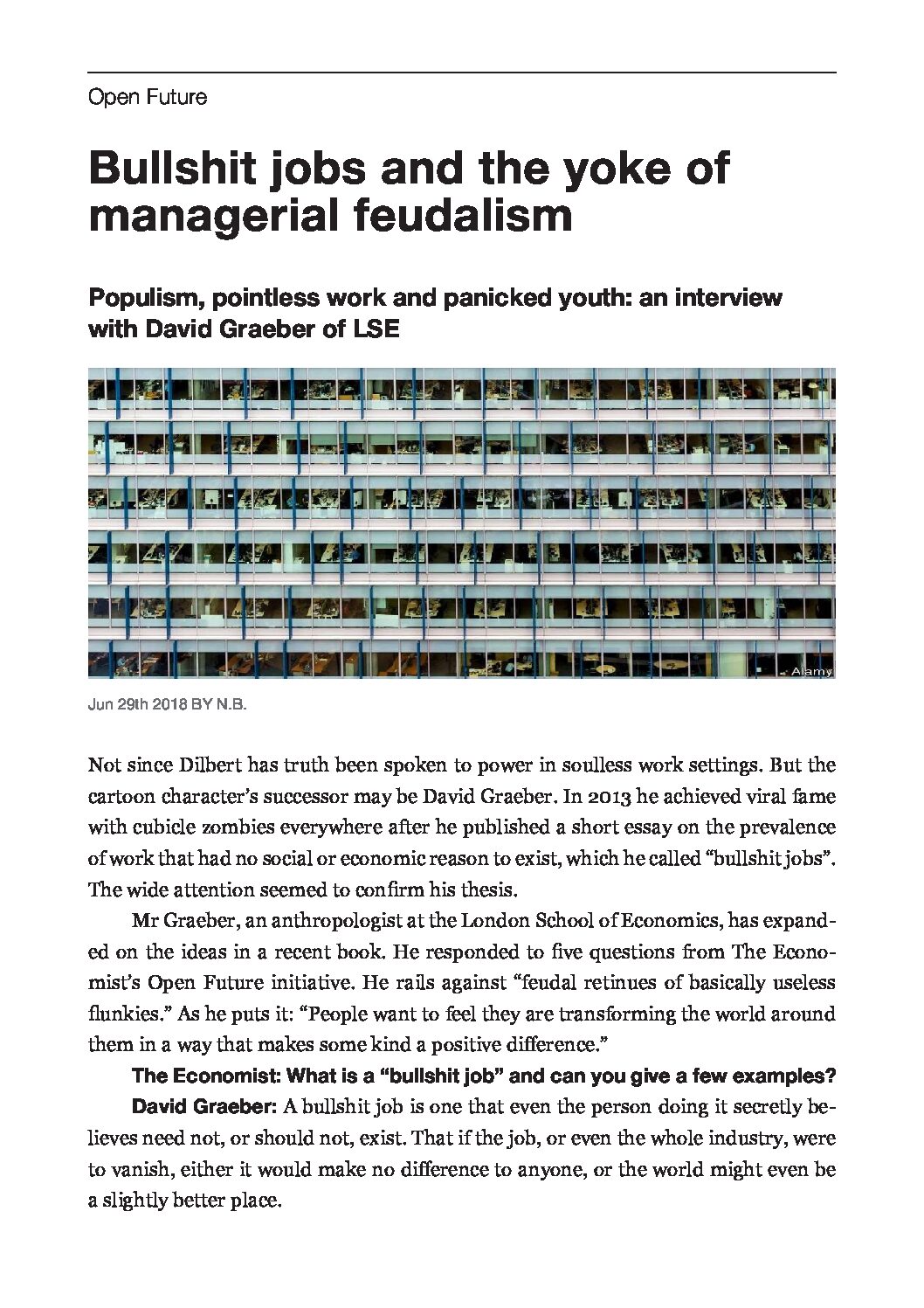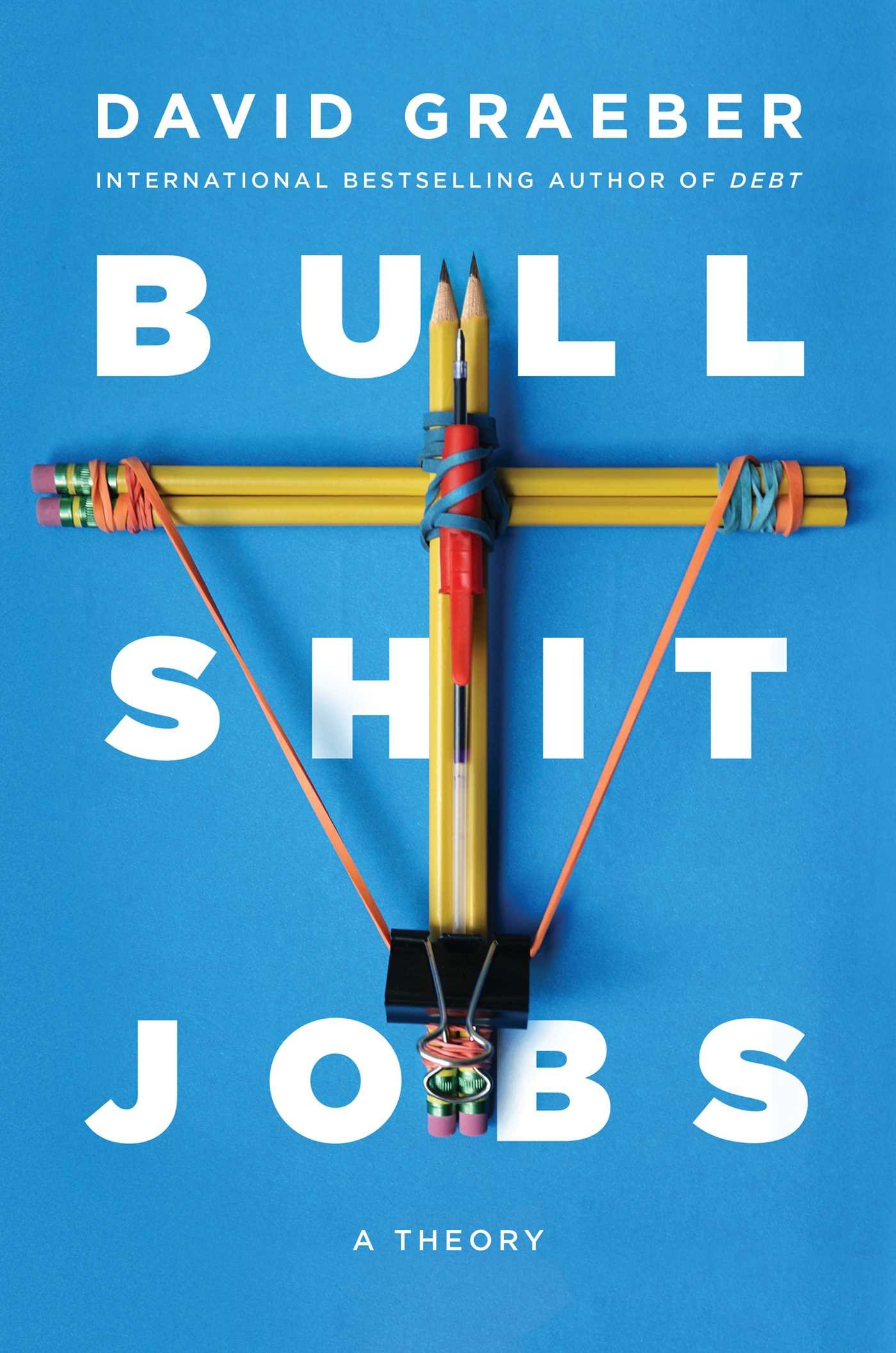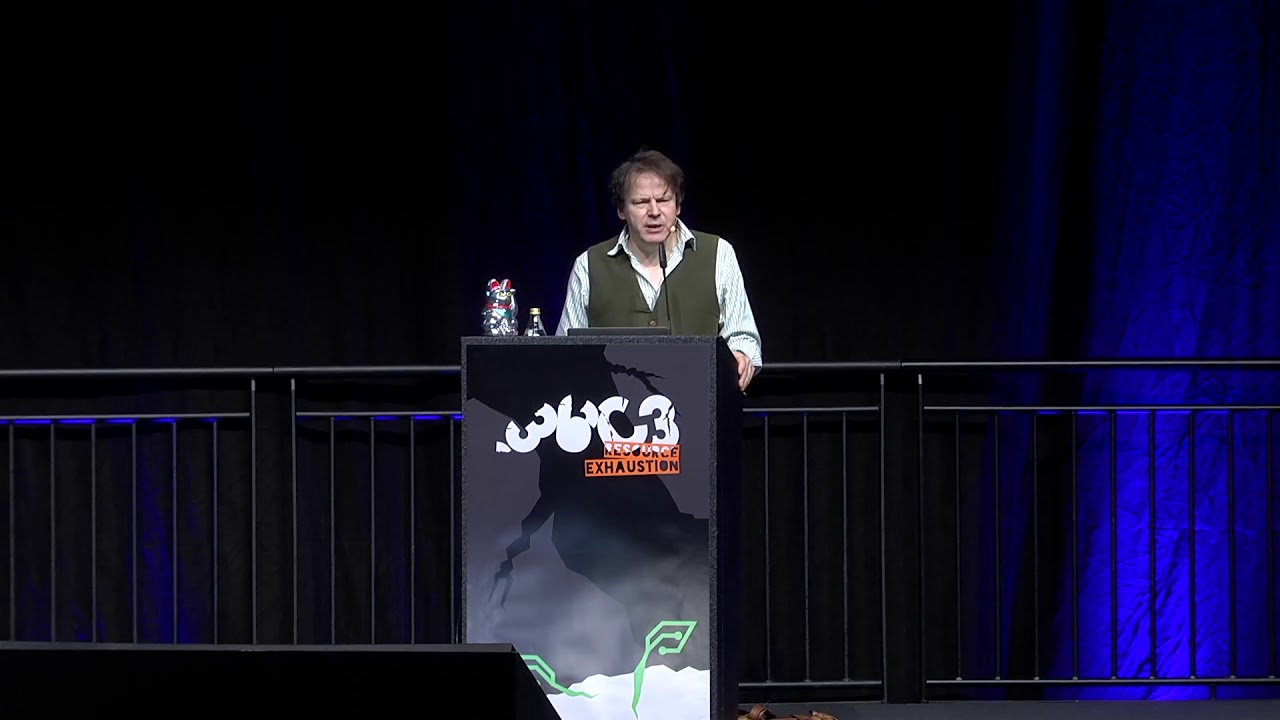
Bullshit jobs and the yoke of managerial feudalism
29 Jun 2018
The “lean and mean” ideal is applied much more to productive workers than to office cubicles. It is especially true in companies whose profits come from finance rather than producing anything. Executives who pride themselves on downsizing use the money to hire troops of people as their feudal retinues creating sort of a managerial feudalism.
Interview on economist.com
Bullshit jobs and the yoke of managerial feudalism
Populism, pointless work and panicked youth: an interview with David Graeber of LSE
By N.B.
Mr Graeber, an anthropologist at the London School of Economics, has expanded on the ideas in a recent book. He responded to five questions from The Economist’s Open Future initiative. He rails against “feudal retinues of basically useless flunkies.” As he puts it: “People want to feel they are transforming the world around them in a way that makes some kind a positive difference.”
* * *
The Economist: What is a “bullshit job” and can you give a few examples?
David Graeber: A bullshit job is one that even the person doing it secretly believes need not, or should not, exist. That if the job, or even the whole industry, were to vanish, either it would make no difference to anyone, or the world might even be a slightly better place.
Something like 37-40% of workers according to surveys say their jobs make no difference. Insofar as there’s anything really radical about the book, it’s not to observe that many people feel that way, but simply to say we should proceed on the assumption that for the most part, people’s self-assessments are largely correct. Their jobs really are just as pointless as they think they are.
If anything, just taking people’s word for it might understate the problem, since if you think that what you’re doing is pointless, but there’s some non-obvious larger big-picture way that you’re really contributing to the greater good, at least the greater good of the organisation, then what’s the chance no one is going to tell you that?
On the other hand, if you think you’re doing something that seems like there’s a good reason to be doing it, but in the larger big-picture you’re not (say, the whole operation that you’re working for is actually some kind of scam, or no one is really reading your reports, etc), well, that’s precisely the situation where they’re least likely to tell you what’s really going on.
If my own research is anything to go by, bullshit jobs concentrate not so much in services as in clerical, administrative, managerial, and supervisory roles. A lot of workers in middle management, PR, human resources, a lot of brand managers, creative vice presidents, financial consultants, compliance workers, feel their jobs are pointless, but also a lot of people in fields like corporate law or telemarketing.
The Economist: What does it say about the modern workplace that these purposeless jobs exist?
Mr Graeber: One thing it shows is that the whole “lean and mean” ideal is applied much more to productive workers than to office cubicles. It’s not at all uncommon for the same executives who pride themselves on downsizing and speed-ups on the shop floor, or in delivery and so forth, to use the money saved at least in part to fill their offices with feudal retinues of basically useless flunkies.
They have whole teams of people who are just there, for instance, to design the graphics for their reports, write accolades for in-house magazines no one reads, or in many cases, who aren’t really doing anything at all, just making cat memes all day or playing computer games. But they are kept on because the prestige and even sometimes the salary of any given manager is measured by how many people he has working under him.
The more a company’s profits are derived from finance rather than from actually making and selling anything, the more this tends to be true. I call it “managerial feudalism.” But it’s not just the FIRE [financial, insurance and real estate] sector: you have a similar infestation of intermediary ranks in the creative industries as well. They keep adding new managerial positions in between the people producing stuff and the guys ultimately paying for it, often whose only role is to sit around all day trying to sell things to each other.
Health and education are equally hard hit: managers now feel they need to each have their little squadron of assistants, who often have nothing to do, so they end up making up new exotic forms of paperwork for the teachers, doctors, nurses… who thus have ever less time to actually teach or treat or care for anyone.
The Economist: You note that a lot of interesting jobs that entail creativity and status are concentrated in affluent cities. Do you think bullshit jobs have contributed to populism and polarisation?
Mr Graeber: I do. I think a lot of the—often quite legitimate—rancor directed at the “liberal elite” is based on resentment of those working-class people see as having effectively grabbed all the jobs where you’ll actually get paid well to do something that’s both fun and creative, but also, obviously benefits society. If you can’t afford to send your kid to a top college and then support them for 2-3 years doing unpaid internships in some place like New York or San Francisco, forget it, you’re locked out.
For everybody else, unless you get very lucky, your choices are largely limited to two options. You can get a basically bullshit job, which will pay the rent but leave you wracked with the guilty feeling that you are being forced, against your will, to be a fraud and a parasite. Or, you can get a helpful, useful job taking care of people, making or moving or maintaining things that people want or need – but then, likely you will be paid so little you won’t be able to take care of your own family.
There is an almost perfect inverse relation between how much your work directly benefits others, and remuneration. The result is a toxic political culture of resentment.
Those in the largely pointless jobs secretly resent teachers or even auto workers, who actually get to do something useful, and feel it’s outrageous when they demand nice salaries and health care and paid vacations too. Working class people who get to do mostly useful things, resent the liberal elite who grabbed all the useful or beneficial work which actually does pay well and treats you with dignity and respect.
Everyone hates the political class who they see (in my opinion, quite rightly) as basically a bunch of crooks. But all the other resentments make it very difficult for anyone to get together to do anything about it. To a large extent, our societies have come to be held together by envy and resentment: not envy of the rich, but in many cases, envy of those who are seen as in some ways morally superior, or resentment of those who claim moral superiority but who are seen as hypocritical.
The Economist: People tend to emotionally adjust to their circumstances, so is there any reason to believe that we would be dramatically more satisfied in a world free from drudgery?
Mr Graeber: The thing that surprised me was just how hard it was for so many people to adjust to what seemed like comparatively minor problems: basically, boredom and sense of purposelessness in life. Why couldn’t they just say, “Okay, so I’m getting something for nothing. Let’s just hope the boss doesn’t figure it out!”
But the overwhelming majority reported themselves to be utterly miserable. They reported depression, anxiety, psychosomatic illnesses that would magically disappear the moment they were given what they considered real work; awful sadomasochistic workplace dynamics.
My own conclusion was that psychologically, it’s not exactly that people want to work, it’s more that people want to feel they are transforming the world around them in a way that makes some kind a positive difference to other people. In a way, that’s what being human is all about. Take it away from them, they start to fall apart. So it’s not exactly drudgery.
As Dostoevsky said somewhere: if you want to totally destroy a prisoner psychologically, just make them dig a hole and fill it in again, over and over, all day long – and in some gulags, they actually tried that out as a form of torture and he was right, it worked. It drove people completely crazy. I think people can put up with even boring work if they know there’s a good reason to be doing it.
As an anthropologist, I know that leisure isn’t itself a problem. There’s plenty of societies where people work two-to-three hours a day maximum, and they find all sorts of interesting things to do with their time. People can be endlessly creative if you give them time to think.
The Economist: People in the West have more freedom to choose their careers than at any time in human history. Does liberalism deserve some credit for that and if so, are people not responsible for their own bullshit jobs?
Mr Graeber: Well if you talk to young people fresh out of college, you don’t hear a lot of them saying, “Ah, the world lies open before me … what then would I best do?”
Sure, you heard that a lot in the 1970s, 80s, even 90s: “What do I really want?” Now, not so much. Most graduates are in a panic over how they’re going to pay their student loans and the real dilemma you hear is: “Can I get a job that will actually pay me enough to live on (let alone be able to have a family someday) that I wouldn’t be entirely ashamed of?”
It’s the same trap I described above: how can you live a life that benefits others, or at least doesn’t hurt anyone in any obvious way, and still be able to take care of a family or the people that you love. And all the while there’s this endless drumbeat of what I call “rights-scolding,” and it comes from the left and right equally. It’s a moral invective towards young people as entitled and spoiled for expecting they deserve any of the things that their parents’ generation (who are usually the ones doing the scolding) took entirely for granted.
So I wouldn’t blame anyone for making the best they can of the situation. The question for me is: why isn’t this situation seen as a major social problem? I mean, if you count all the people who are in real work in support of bullshit jobs, all the cleaners or receptionists or drivers who don’t know that the company they’re working for is basically a tax dodge or somesuch, and the bullshitisation of real work, then maybe half of the work that’s being done is totally unnecessary.
Just think what kind of culture, music, science, ideas might result if all those people were liberated to do things they actually thought were important. So if the question is one of personal responsibility, I’d say: let’s just give everyone enough to live on, some sort of universal basic income, and say “okay, you’re all free now to decide for yourselves what you have to contribute to the world.”
Then, sure, we could say that people would be responsible for what they came up with. And sure, a lot of it would be nonsense. But it’s hard to imagine a full 40-50% would be doing nonsense, and that’s the situation that we have today. And if we get even one or two new Miles Davises or Einsteins or Freuds or Shakespeares out of the deal, I’d say we’d have more than made back our investment.


